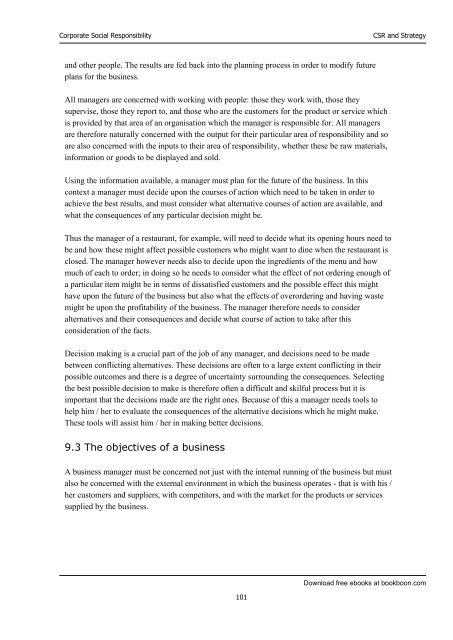Defining Corporate Social Responsibility - Tutorsindia
Defining Corporate Social Responsibility - Tutorsindia
Defining Corporate Social Responsibility - Tutorsindia
You also want an ePaper? Increase the reach of your titles
YUMPU automatically turns print PDFs into web optimized ePapers that Google loves.
<strong>Corporate</strong> <strong>Social</strong> <strong>Responsibility</strong><br />
CSR and Strategy<br />
and other people. The results are fed back into the planning process in order to modify future<br />
plans for the business.<br />
All managers are concerned with working with people: those they work with, those they<br />
supervise, those they report to, and those who are the customers for the product or service which<br />
is provided by that area of an organisation which the manager is responsible for. All managers<br />
are therefore naturally concerned with the output for their particular area of responsibility and so<br />
are also concerned with the inputs to their area of responsibility, whether these be raw materials,<br />
information or goods to be displayed and sold.<br />
Using the information available, a manager must plan for the future of the business. In this<br />
context a manager must decide upon the courses of action which need to be taken in order to<br />
achieve the best results, and must consider what alternative courses of action are available, and<br />
what the consequences of any particular decision might be.<br />
Thus the manager of a restaurant, for example, will need to decide what its opening hours need to<br />
be and how these might affect possible customers who might want to dine when the restaurant is<br />
closed. The manager however needs also to decide upon the ingredients of the menu and how<br />
much of each to order; in doing so he needs to consider what the effect of not ordering enough of<br />
a particular item might be in terms of dissatisfied customers and the possible effect this might<br />
have upon the future of the business but also what the effects of overordering and having waste<br />
might be upon the profitability of the business. The manager therefore needs to consider<br />
alternatives and their consequences and decide what course of action to take after this<br />
consideration of the facts.<br />
Decision making is a crucial part of the job of any manager, and decisions need to be made<br />
between conflicting alternatives. These decisions are often to a large extent conflicting in their<br />
possible outcomes and there is a degree of uncertainty surrounding the consequences. Selecting<br />
the best possible decision to make is therefore often a difficult and skilful process but it is<br />
important that the decisions made are the right ones. Because of this a manager needs tools to<br />
help him / her to evaluate the consequences of the alternative decisions which he might make.<br />
These tools will assist him / her in making better decisions.<br />
9.3 The objectives of a business<br />
A business manager must be concerned not just with the internal running of the business but must<br />
also be concerned with the external environment in which the business operates - that is with his /<br />
her customers and suppliers, with competitors, and with the market for the products or services<br />
supplied by the business.<br />
101<br />
Download free ebooks at bookboon.com
















